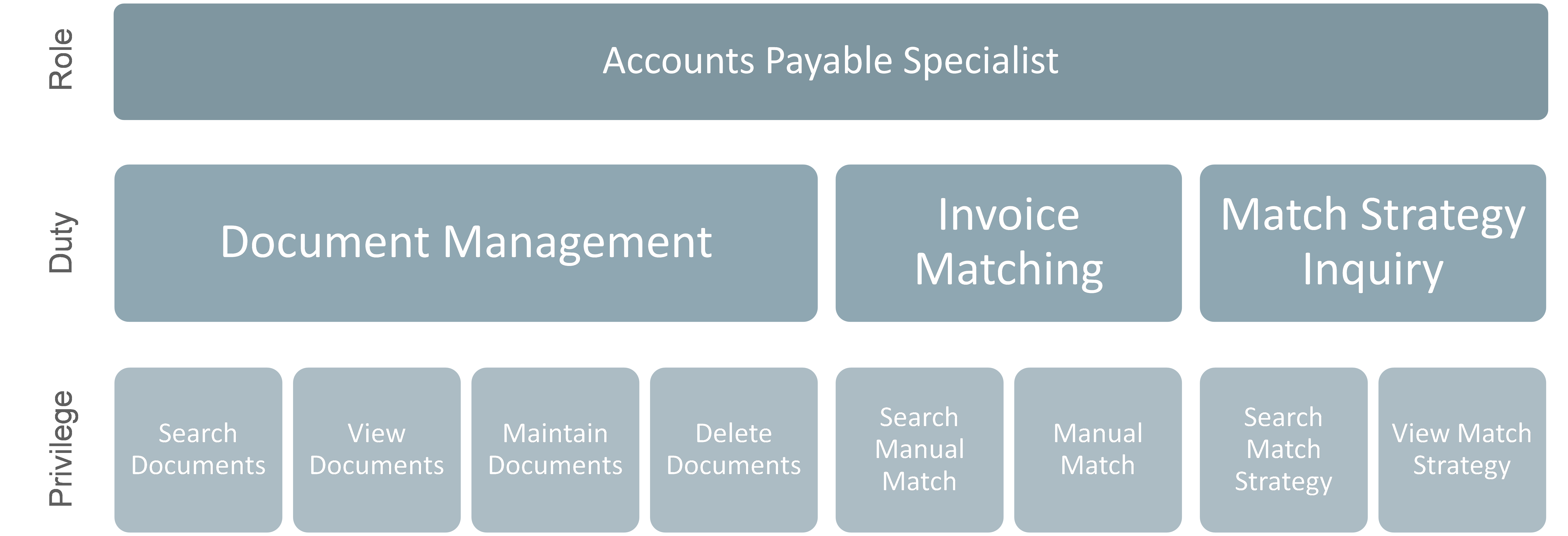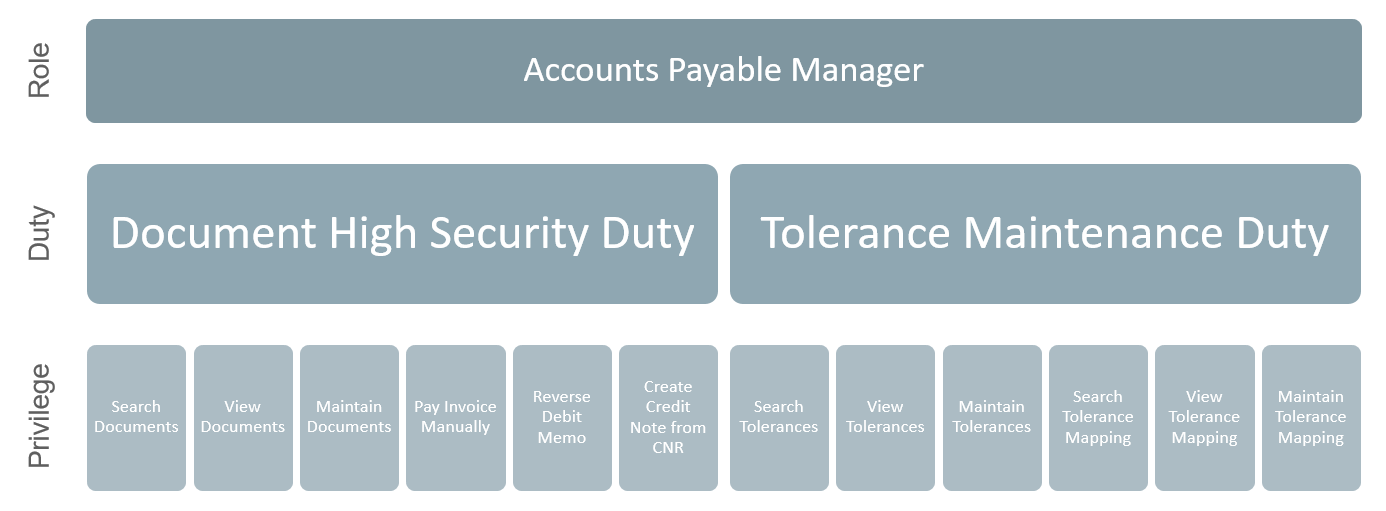| Oracle® Retail Invoice Matching Security Guide Release 22.1.201.0 F56546-01 |
|
 Previous |
 Next |
Roles are used to classify users based on job responsibilities and actions to be performed in the application. Using roles, a user's access can be restricted to specific areas or functions within the system. Users must be associated with at least one job role in order to access the application and may be associated with several roles if desired.
For example, within Invoice Matching, a user with a business role of Accounts Payable Specialist may be able to perform only the tasks associated to a the provided Accounts Payable Specialist job role profile such as, creating, modifying, and matching merchandise invoices. He might additionally have view only access to tolerance and match strategy screens for visibility to matching parameters. Whereas an Accounts Payable Manager might have access to the set of tasks that are related to the maintenance of the matching parameters and other business processing parameters. While, an Administrator would require access to all areas.


A default security configuration is provided with each application during installation and is intended to be used as a starting point as you define the roles that align for your business and users. The provided roles can be modified by adding or removing duties and/or individual privileges to adjust the access granted to the role, or the roles can be deleted completely. Additional roles can be created as well and can be mapped to the desired duties or privileges. Administrator users can change the mappings of roles, duties and privileges in Invoice Matching's User Interface. Details about how to manage these application security policies are available in Chapter 2, Manage Security Policies in the Oracle Retail Merchandising Administration Guide.
There are eight roles provided in the default security configuration:
Application Administrator - The Invoice Match Application Administrator is a part of a retailer's IT department responsible for maintaining and configuring the Oracle Retail Invoice Match application. Primary responsibilities include:
Maintain daily operations, such as daily batch processes of the application.
Supporting end-users and providing the first level of support for the application.
Applying patches and upgrades to the application on a regular basis.
Troubleshooting and resolving product issues.
Setting up users and security privileges for the application.
Data Steward - The Invoice Match Data Steward is responsible for the management of foundational data elements for the Oracle Retail Invoice Match application, which includes ensuring the completeness and accuracy of the data, as well as development and enforcement of standard processes.
Accounts Payable Manager - The Accounts Payable Manager develops and recommends policy and procedures to govern the payment of company bills for optimal cash flow, to minimize operational costs, and to meet regulatory requirements. Responsibilities include:
Measure and monitor department work activities for accuracy, efficiency, and policy compliance.
Approve or manage approval of certain suppliers, invoices, and payments.
Manage supplier account inquiries.
Analyze and manage department budget.
Manage maintenance of accounts payable ledger.
Prepare status reports for management.
Manage statutory reporting such as 1099 and tax.
Accounts Payable Specialist - The Accounts Payable Specialist enters invoices ensuring accuracy, uniqueness, and completeness. They also match invoices to correct receipts (receivers) and or purchase orders, ensure that invoices comply with company policy and with agreements such as purchase orders. Responsibilities include:
Processes invoices for discount, 1099 withholding, accrued taxes, and correct expense accounts.
Verifies that imported invoices are accurate and complete.
Directs unauthorized purchases or invoices with exceptions (e.g. price variance) to AP Manager.
Matches cardholder reconciliation to procurement card statements.
Process travel advances, petty cash reimbursements, check requests, and expense reports on time.
May post transactions to the general ledger.
Monitors encumbrances and expenditures (In Public Sector).
Creates payments, taking advantage of beneficial discounts.
Fields vendor inquires on payments and invoices.
May maintain vendor file.
Financial Analyst - The Financial Analyst is responsible for analyzing financial information of an area within the enterprise to assist in decision making and assist with planning for the brand. This includes:
Supporting the finance team with scheduled reports and budgets.
Monitoring performance indicator trends and analyze causes of unexpected variances.
Assisting with financial report generation – budget and trend preparation, business plans.
Assisting with cost control and conduct budget meetings with department managers.
Developing, analyzing, and preparing data for use in negotiations with suppliers.
Managing and approving the corporate view of vendor trade funds.
Financial Manager - The Financial Manager is responsible for the financial accounting of a retailer's business, which includes making sure that all financial operations are running smoothly, bills are paid on time, figures are reported timely and accurately, period end books are closed properly. This includes;
Ensuring period end reporting is completed in a timely manner.
Ensuring the timely resolution of auditing issues.
Ensuring in the timely resolution of vendor payment issues, including the resolving cost and other invoicing discrepancies.
Identifying risks and opportunity areas to the operations.
Providing performance reporting highlighting trends and opportunities to assist in improving profits, margins and reducing costs.
Buyer - Develops business strategies and seasonal assortment plans to maximize the development of the brand, as well as sales and profits for a department or assigned area. Their primary responsibilities are:
Performing market and competitive analysis and analyze sales trends to keep abreast of current trends.
Developing business strategies outlining strengths, weaknesses, new opportunities and threats.
Analyzing and approving new product or concepts for their department.
Maintaining relationships, resolve issues and conduct negotiations with significant suppliers and agents.
Managing sales and margin dollar performance against plan.
Recommending adjustments to the plan to maximize sales, profits, and to protect the brand.
Corporate Inventory Control Analyst - Inventory control analysts at corporate collaborate with their warehouse and store counterparts to ensure accurate levels of inventory through the retailer's supply chain. This includes:
Scheduling, coordinating, and reviewing cycle counts performed in stores and warehouses.
Monitoring and resolving inventory discrepancies, problem orders, and transfer issues.
Making recommendations to minimize supplier invoice discrepancies.
Analyzing inventory-related procedures to suggest process improvements.